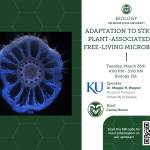Research-based courses have been lauded for involving more students in undergraduate research and providing students with opportunities to achieve positive outcomes that they may not achieve in traditional laboratory settings. One such outcome, which is yet underexplored, is the development of an ability to navigate scientific obstacles both cognitively and emotionally. This outcome is important since the ability to navigate obstacles and failures is considered a hallmark of a scientific disposition and has been hypothesized to increase students’ persistence in STEM. Research-based courses such as CUREs offer unique opportunities for students to achieve this outcome by engaging them in authentic research that affords students opportunities to grapple with challenge and failure in a supportive environment. Yet, there is little research that investigates this outcome or strives to unpack how STEM students develop the ability to see failure as an opportunity to learn – an epistemic experience – as opposed to a setback. This talk explores students’ engagement with failure in research-based courses, how their unique identities influence their views of failure, and how we, as STEM instructors, might scaffold failure experiences to frame them as epistemic. We will apply prior research and theory to predict how students’ failure experiences influence their future engagement with STEM challenges.



